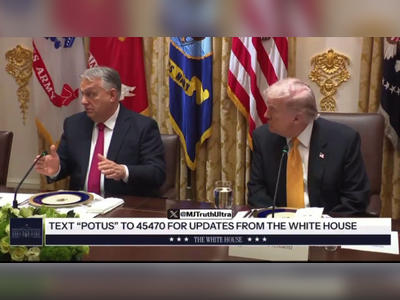
Friedrich Merz Elected German Chancellor Amidst Political Challenges
The Christian Democratic Union leader faced a protracted election process before securing the chancellorship.
Friedrich Merz, leader of the Christian Democratic Union (CDU), was elected Chancellor of Germany on May 6, 2025, after navigating an unprecedented dual-ballot process in the Bundestag.
The election, unusual in German parliamentary history, reflects significant political difficulties as Merz embarks on his leadership of Europe's largest economy.
At 69 years old, Merz faced a challenging election earlier in February 2025, leading to his coalition with the Social Democrats under the outgoing Chancellor Olaf Scholz.
He ultimately secured 325 votes out of 630 in the decisive second ballot.
The initial vote, which took place earlier that day, resulted in Merz failing to achieve the necessary majority, raising concerns about his support within the coalition.
The parliamentary vote followed the dissolution of Scholz's government in November 2024, leading to a national political crisis.
Merz's failure to win outright in the first round marks a significant departure from the norm for chancellor candidates in post-war Germany, where parliamentary votes have typically resulted in smoother transitions of power.
This electoral backdrop highlights the frailty of both Merz's leadership and the coalition agreement guiding his administration.
Political analysts suggest the circumstances surrounding his election may adversely impact his ability to execute policies aimed at revitalizing Germany amid ongoing economic challenges and geopolitical uncertainties, particularly in light of tensions with Russia and changing U.S. foreign policy.
Merz's unpopularity among the electorate and emerging dissent within his conservative faction underscore the difficulties he will likely face.
He has been criticized for reversing a campaign promise regarding strict national budgetary discipline in order to allocate funds for a substantial military rearmament program, responding to perceived threats from Russia and a potential withdrawal of U.S. military support in Europe.
The internal discord within his party has been underscored by agitation from the right-wing Alternative for Germany (AfD) party, which has gained traction in public opinion polls and secured about 20% of votes in the last elections.
AfD leaders have publicly called for new elections, interpreting Merz's election struggles as evidence of political instability.
In his upcoming term, Merz has committed to enhancing support for Ukraine and establishing stronger alliances with countries such as France and Poland.
His government aims to address pressing needs including the modernization of the German military and critical infrastructure, which has deteriorated due to years of underinvestment.
Domestically, Merz's agenda appears to include stringent measures on immigration, aimed at countering the rise of the AfD.
His success will depend heavily on collaboration with the Social Democrats, who now control key ministerial positions including the Ministry of Finance and the Ministry of Defense, which remains under the incumbent Boris Pistorius.
The prospect of stability and effective governance under Merz's chancellorship remains uncertain as he prepares for a demanding four-year term.
The election, unusual in German parliamentary history, reflects significant political difficulties as Merz embarks on his leadership of Europe's largest economy.
At 69 years old, Merz faced a challenging election earlier in February 2025, leading to his coalition with the Social Democrats under the outgoing Chancellor Olaf Scholz.
He ultimately secured 325 votes out of 630 in the decisive second ballot.
The initial vote, which took place earlier that day, resulted in Merz failing to achieve the necessary majority, raising concerns about his support within the coalition.
The parliamentary vote followed the dissolution of Scholz's government in November 2024, leading to a national political crisis.
Merz's failure to win outright in the first round marks a significant departure from the norm for chancellor candidates in post-war Germany, where parliamentary votes have typically resulted in smoother transitions of power.
This electoral backdrop highlights the frailty of both Merz's leadership and the coalition agreement guiding his administration.
Political analysts suggest the circumstances surrounding his election may adversely impact his ability to execute policies aimed at revitalizing Germany amid ongoing economic challenges and geopolitical uncertainties, particularly in light of tensions with Russia and changing U.S. foreign policy.
Merz's unpopularity among the electorate and emerging dissent within his conservative faction underscore the difficulties he will likely face.
He has been criticized for reversing a campaign promise regarding strict national budgetary discipline in order to allocate funds for a substantial military rearmament program, responding to perceived threats from Russia and a potential withdrawal of U.S. military support in Europe.
The internal discord within his party has been underscored by agitation from the right-wing Alternative for Germany (AfD) party, which has gained traction in public opinion polls and secured about 20% of votes in the last elections.
AfD leaders have publicly called for new elections, interpreting Merz's election struggles as evidence of political instability.
In his upcoming term, Merz has committed to enhancing support for Ukraine and establishing stronger alliances with countries such as France and Poland.
His government aims to address pressing needs including the modernization of the German military and critical infrastructure, which has deteriorated due to years of underinvestment.
Domestically, Merz's agenda appears to include stringent measures on immigration, aimed at countering the rise of the AfD.
His success will depend heavily on collaboration with the Social Democrats, who now control key ministerial positions including the Ministry of Finance and the Ministry of Defense, which remains under the incumbent Boris Pistorius.
The prospect of stability and effective governance under Merz's chancellorship remains uncertain as he prepares for a demanding four-year term.









